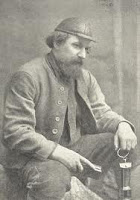Sunday 19 August 2012
Collier Lads
In one way it was just accident that I was reading Florence Boos and Patrick O'Sullivan’s superb article on Devon Great Consols, the copper mine from which the Morris family made its great wealth (Society Journal, summer 2012), at the very moment that South African police opened fire with automatic weapons on striking platinum miners at Marikana and killed 34 of them. An accident of timing, perhaps; but the common factors here are the brutal hardship and dangers of the work of mining, and the brutal repression with which efforts to remedy them are typically met by capitalist mine owners. As we in the UK saw clearly enough not so long ago when Margaret Thatcher used the police as a private army against striking coal-miners in 1984.
Mining has always generated a culture of its own as well as a combative politics, so, as a gesture of solidarity with the dead South African miners, let us recall one notable nineteenth-century English representative of that culture, the so-called ‘collier-poet’, who William Morris refers to in a letter of 21 May 1889 as ‘my friend Mr Joseph Skipsey’ (pictured above). Skipsey’s miner father had been shot dead by a special constable, and he himself subsequently worked in the Northumberland pits for many years (just north of my own family in the County Durham pit-villages). One of his best-known poems is ‘The Collier Lad’, of which I give the first stanza here as a taster:
MY lad he is a Collier Lad,
And ere the lark awakes,
He's up and away to spend the day
Where daylight never breaks;
But when at last the day has pass'd,
Clean washed and cleanly clad,
He courts his Nell who loveth well
Her handsome Collier Lad.
Chorus:
There's not his match in smoky Shields;
Newcastle never had
A lad more tight, more trim, nor bright
Than is my Collier Lad.
I admire the dash and spirit of the poem, but it also looks sadly naive in the face of the violence capitalism is always prepared to unleash against miners and their families.
Subscribe to:
Post Comments (Atom)





No comments:
Post a Comment